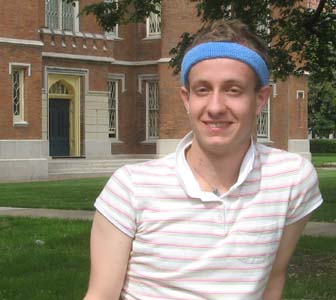

Venture Boldly

There's nothing new about a group of farmers demanding justice. But it is new for David Ferris ’08, an independent major in political economics of inequality and anthropology/sociology. Ferris researched a small peasant movement in northeast Thailand. “It is a social movement that has been fighting expanded development at a local mine.”
Always interested in social issues for moral reasons, Ferris says he takes the class struggles to heart. “History is pushed along by and motivated by class conflict. My interest is in that class conflict and in human rights and development.”
It was on the heels of a study abroad program in Thailand that Ferris chose to go back to the northeast region, in an area with a population of 20,000, to fulfill a senior honor’s project.
Years ago, the community decided to take action and fight the owners of the Somboon mine on plans to expand operations. The demands of the people, says Ferris, have not gone unanswered.
Landowners worried about environmental affects. Mining the mineral would strip the mine and leave a surplus of salt residue. "The area relies on wage labor. Although officials touted that the project would bring money and jobs, the people were skeptic. The counter to that is that these projects exacerbate existing political differences."
Ferris says that there are grassroots organizations that are helping the people fight different development projects, in this case the Somboon mine. “People are living in slums and the government is trying to kick them off their land. We are trying to get some political voice, some representation for these oppressed groups.”
He had four months of experience/contact with this issue and this village. “We interviewed different groups in the conflict. Company representatives, people leaders of organization, government employees that worked at the ministries, and we talked to supporters.”
Declaring the experience as once in a lifetime chance, Ferris says that what he learned could not be accomplished in a classroom. “I was living in the village for five weeks. I had a lot of extended contact.”
“I think the big thing for me, being an anthropologist, was to understand their own struggle, own life, what they are up against. Theoretically rich. I fell in love with the movement. Their willingness to sacrifice everything to keep their right to have. a livelihood, a family and a place to call home. That kind of honesty was interesting to me.”
As the company sold the mine to a multi national corporation in Thailand instead of a Canadian Corp running the project, demonstrators saw the sale as a victory for the movement. For six years the grassroots movement and the posturing of the community has resulted in a delay and caused significant damage to the company in delaying the project. “They have been able to interrupt the process at every step. And so I highlight that and the effect of having mobilization in the village they have the sense of a more political consciousness. That they are citizens participating I think they have a sense of their rights. And what is development as defined by the government and what development should be as defined by the people.”
The new company has invested a ton of money in public relations in an attempt to corral the mass media to their advantage. They have more research and more cultural sensitivity. “But they are as much capitalist as the other company,” Ferris says.
He sees the mine eventually being built, but doesn’t see that as a reason to stop the fight. He also believes he will be working in some kid of movement or for a non-profit agency, although he has no immediate plans following graduation. “Ten years from now I could be doing something completely different. I could be a professor or a farmer. I’m leaving it wide open.”
“A particular idea like human rights can be made to mean different things in different contexts. It is in the struggle that we can defend the important parts of these concepts. It is the struggle - the journey that is important,” he surmises.
In leaving Knox Ferris says the college has done a great job of hiring people who are great teachers and want to teach. They are invested in the students. I will miss them, and I will miss my friends.

Published on June 10, 2008